Weili Lin, PhD, is the principal investigator of a research project to improve outcomes for children exposed to opioids, and Susan Gaylord, PhD, is the UNC site PI for a second project to help people with low back pain.

The National Institutes of Health announced today approximately 375 awards totaling $945 million for researchers in 41 states as part of the NIH HEAL (Helping to End Addiction Long-term) Initiative, an aggressive, trans-agency effort launched in 2018 to improve prevention and treatment strategies for opioid misuse and addiction, and to enhance pain management.
For a separate study, Boston University is the lead institution for a $907,601 grant to study mindfulness techniques to alleviate low back pain. The project includes the University of Pittsburgh, the University of Massachusetts, and UNC-Chapel Hill. Susan Gaylord, PhD, associate professor of physical medicine and rehabilitation at the UNC School of Medicine, is the UNC site principal investigator. The title of the project is “Group-based mindfulness for patients with chronic low back pain in the primary care setting.”
“Our goal is to help patients in a non-invasive but effective and inexpensive way to curb chronic low back pain,” said Gaylord, who is the director of the program on integrative medicine and the director of the mindfulness-based stress and pain management program at the UNC School of Medicine. “Chronic low back pain is one of the most common conditions treated in the primary care setting, yet treatment remains unsatisfactory for many patients, and use of opioids has many unintended consequences, such as addiction, overdose, and diversion. Mindfulness has been shown to be effective for treatment of chronic low back pain, yet it remains underutilized in primary care and is not generally reimbursed by health insurance. This project will plan a pragmatic trial to better understand how a group-based mindfulness program can be effectively integrated into real-life primary-care settings, thus improving outcomes and increasing access to non-opioid treatments.”
NIH Director Francis S. Collins, MD, PhD, said, “It’s clear that a multi-pronged scientific approach is needed to reduce the risks of opioids, accelerate development of effective non-opioid therapies for pain and provide more flexible and effective options for treating addiction to opioids. This unprecedented investment in the NIH HEAL Initiative demonstrates the commitment to reversing this devastating crisis.”
The HEAL Initiative has built on extensive, well-established NIH research, including basic science of the complex neurological pathways involved in pain and addiction, implementation science to develop and test treatment models, and research to integrate behavioral interventions with medication-assisted treatment for opioid use disorder. Successes from this research include the development of the nasal form of naloxone, the most commonly used nasal spray for reversing opioid overdose, the development of buprenorphine for the treatment of opioid use disorder, and evidence for the use of nondrug and mind/body techniques such as yoga, tai chi, acupuncture, and mindfulness meditation to help patients control and manage pain.
NIH has worked with experts from public and private organizations to identify the areas that would most benefit from focused efforts by NIH alone or in partnership with outside organizations. The NIH HEAL Initiative will continue to bolster research across NIH to improve treatments for opioid misuse and addiction and enhance pain management.
Media contact: Mark Derewicz